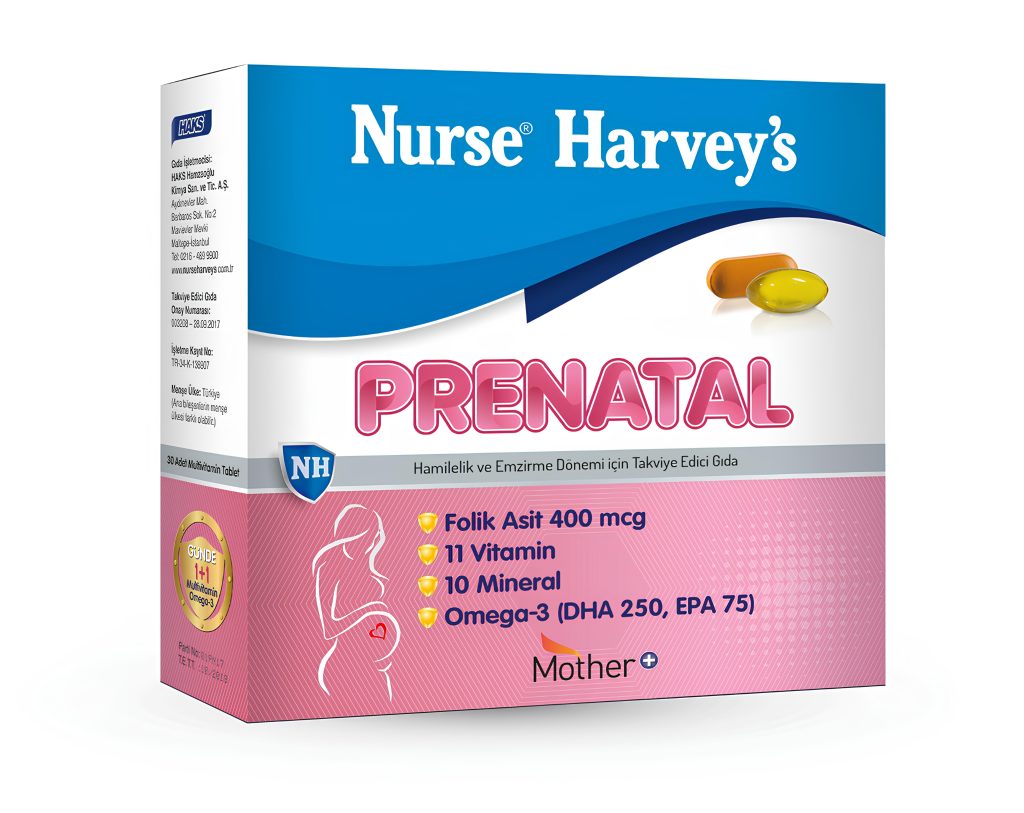

Vitamin A is an organic (carbon-containing) compound that is necessary to keep the body’s metabolism running smoothly. It is necessary for vision, growth, reproduction, embryo development, blood production, immune system and tissue cell growth. It helps in the formation of the body’s immune system against diseases.
Vitamin B1, like all vitamins of the B complex, is a water-soluble vitamin and must be taken daily as it is not stored in the body. The energy produced by thiamine plays an important role in brain, nervous system, muscle, heart and gastrointestinal functions.
Vitamin B2, like other B group vitamins, is naturally found in some foods. Essentially, its function is to participate in the process of producing the energy necessary for the body by helping the breakdown of proteins, fats and carbohydrates taken into the body.
Vitamin B3, also known as Niacin, is one of the eight B vitamins. It plays a role in converting the food we eat into energy. It helps the body use protein and fat and keeps the skin, hair and nervous system healthy.
Vitamin B6, which plays important roles such as brain development, nervous system, hormonal structure, immune system and improving mood, not only ensures the production of neurotransmitters such as serotonin and dopamine, but also plays a key role in the formation of red blood cells and preventing anemia.
Biotin supports tissue formation and regeneration. It takes part in the production of keratin, which is the basic protein for hair, skin and nail formation. For this reason, biotin is an important vitamin for skin, hair and nail health. Biotin deficiency can cause hair to weaken and fall out and nails to become brittle.
Folic acid is effective in producing white and red blood cells in the bone marrow. The benefits of folic acid include the fact that red blood cells play a role in carrying oxygen in the blood, and white blood cells play a role in body defense.
Additionally, it contributes to the health of the body’s fat and glycogen stores. vitamin B9; It has many benefits for the healthy physical and mental development of the baby, especially in pregnant women. On the other hand, this vitamin is important in reducing the risk of heart attack and stroke.
Vitamin B12 (cobalamin) helps keep the body’s blood and nerve cells healthy, helps build DNA, supports bone as well as hair, skin and nail health, and helps prevent megaloblastic anemia, which causes feeling tired or weak.
Vitamin C helps heal wounds, repair and protect teeth, skin and cartilage. Vitamin C also, as an antioxidant, helps prevent or delay certain cancers and heart disease in the body, fighting free radicals that can help support healthy aging.
Having the right levels of vitamin D, adequate calcium and phosphorus in the body is important for building and maintaining strong bones. Vitamin D is used to treat and prevent bone disorders such as rickets.
One of the fat-soluble vitamins, vitamin E, plays crucial roles in various areas such as skin health, eye health, and hormonal regulation. It is also one of the vitamins with antioxidant properties, contributing significantly to strengthening the immune system.
Chromium is a mineral essential for the body, contributing to the functionality of the insulin hormone and influencing carbohydrate, protein, and fat metabolism. It has been suggested that chromium may support weight loss and aid in blood sugar control, particularly in individuals with diabetes
Iron, one of the many minerals necessary for the human body, is used for the production of hemoglobin (HGB), which is found in red blood cells that carry oxygen. Low iron levels cause red blood cells to not be sufficiently oxygenated and therefore produce less.
Iodine mineral has many important functions in the body, especially in energy metabolism. It is an important component of thyroxine and triiodothyronine, which are among the thyroid hormones. Thyroid hormones regulate many biochemical reactions that occur in the body, such as protein synthesis.
Copper is used by enzymes that help provide energy to the brain, assist the brain’s defense system, and transmit signals throughout the body. Copper deficiency has been associated with diseases such as Alzheimer’s disease that hinder brain development or affect the ability to learn and remember.
Involved in more than 300 enzyme reactions in the human body, magnesium plays an important role in many processes in the body, including muscle and nerve function, regulation of blood sugar levels and blood pressure, and the construction of protein, bone and DNA, energy production and supporting the immune system.
Although molybdenum is not as widely known as the major minerals, it is an extremely important mineral for maintaining normal body functions. Molybdenum mineral, which plays a role in the processing of proteins and genetic materials, also helps the body break down toxic substances.
Manganese is an essential mineral that plays a role in the body’s calcium absorption, blood sugar regulation, fat and carbohydrate metabolism, normal brain and nerve function, and the formation of bones, sex hormones and connective tissues.
Selenium is an important mineral in the body and plays an important role in many biological processes. Selenium, which is taken mostly through soil and water in nature, functions as an antioxidant in the body and helps prevent the formation of oxidative stress in cells.
Approximately 99 percent of the calcium in the human body is found in bones and teeth. Calcium has many functions. Calcium is essential for the growth, development and maintenance of bones. Calcium contributes to bone development during growth in children.
The total amount of zinc, which plays an important role in the immune system and metabolic activities, is estimated to be 2 g in adult individuals. More than 80% of this is found in bones, muscles, hair and skin. For a strong nervous system and immune system, sufficient zinc intake must be provided to the body.
Omega – 3 fatty acids have many health benefits. It protects cardiovascular health, reduces triglyceride levels, increases HDL, known as good cholesterol, helps reduce the risk of heart attack and stroke, and prevents high blood pressure. Omega – 3 fatty acids have an anti-inflammatory effect.

All rights reserved.
